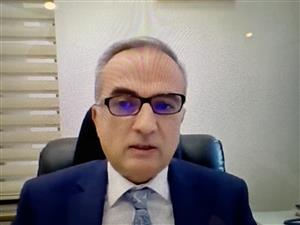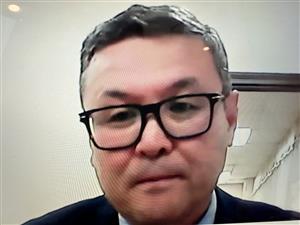Caspian Policy Center Spotlights Central Asia’s Future
By Elaine Pasquini

Washington: The Caspian Policy Center hosted a webinar on September 11, 2024, to discuss the increasing regional partnership and future of Central Asia and the South Caucasus. The online event was held one month after the Sixth Consultative Meeting of Central Asian countries convened in Astana wherein heads of state affirmed the growing momentum for regional cooperation.

/Eric Rudenshiold |

Farid Shafiyev |

Javlon Vakhabov |

Yerkin Tukumov |
Ambassador Javlon Vakhabov, managing director of the Tashkent-based International Institute for Central Asia, vowed that Uzbekistan, which will helm the chairmanship of the Consultative Meeting in the coming year, will continue to stress the importance of strengthening regional cooperation.
Today, Uzbekistan, Kazakhstan, Kyrgyzstan, Tajikistan and Turkmenistan enjoy unprecedented levels of cooperation in investment projects in automotive, agriculture, and textile industries which have significantly boosted the regional economy, Vakhabov said.
Tashkent’s ties with Baku are also deepening, he added. “Azerbaijan provides a crucial strategic road to Europe and the collaboration across sectors like renewable energy, logistics, and transport is a testament to this growing relationship. Azerbaijan’s involvement in the recent Consultative Meeting reflects its increasing role in the region’s geopolitics.”
“Achieving an economic breakthrough is crucial for the stability and prosperity of Central Asia and our focus will be on creating a singular regional market improving trade, investment flows, and fostering industrial cooperation,” he continued.
While China and Russia remain critical trading partners, Central Asia is gradually pivoting towards diversified foreign relations, Vakhabov said. The countries in the region are exploring stronger ties with Turkey, the European Union, Japan, Korea, and the Gulf Cooperation Council states.
Central Asia’s development is also closely tied to the stability and active participation of Afghanistan in regional affairs. Uzbekistan recognizes its neighbor’s crucial role as a transit hub between Central Asia and South Asia which is essential for unlocking new economic opportunities. “Without Afghanistan’s participation, our regional integration efforts will face significant challenges, particularly in transport and logistics,” he stated.
Uzbek Prime Minister Abdulla Aripov’s visit to Afghanistan for purposes of enhancing trade relations resulted in the opening of the International Trade Center at Termez on August 29. This center was built to support entrepreneurs by improving business environment logistics and simplifying administrative procedures.
In 2018, under the initiative of President Shavkat Mirziyoyev a vocational educational center was established in Termez. Today, some 700 Afghan citizens, including 200 women and girls, have received training there. Recently, Saida Mirziyoyev, assistant to the president, participated in a roundtable discussion in Qatar highlighting Afghanistan’s shortage of qualified medical personnel. As part of a landmark agreement,160 Afghan women will receive medical education in Uzbekistan supported by a $2.2 million investment from Qatar. This initiative will provide both educational and living expenses for the Afghan women, he explained.
“We are fully aware of the responsibilities and opportunities that lie ahead,” Vakhabov stated. “And our region is the turning point and the decisions we make today will shape the future for generations to come. It is up to us to create a region that not only works together but thrives together.”
“We are the ones who will shape the future – one of deeper integration, stronger cooperation, and lasting prosperity,” he said. “What comes next is a stronger, more united, resilient Central Asia ready to face the challenges of a rapidly changing world while creating opportunities for our people and future generations.”
Yerkin Tukumov, director of Kazakhstan’s Institute for Strategic Studies, explained that 85 percent of Kazakhstan’s exports are raw material exports such as oil, gas, and metals. “We need to catch up with not only our export diversity but also with the diversification of our trade partners,” he said.
In addition, “we need to catch up with past missed opportunities in cooperation with other countries. We don’t have another 30 years to experiment because global warming is already here and there is a new reality in Afghanistan.”
There have also been demographic shifts in Kazakhstan. “The country is more religious and there is a new generation that is more mobile and more technologically advanced, more open and they have different sources of alternative information,” Tukumov related.
Farid Shafiyev, chairman of the Baku-based Center of Analysis for International Relations, pointed out that in addition to the Russian-Ukrainian war, the rising struggle between the US and China has implications for countries of the Caspian region, as does the new government in Afghanistan.
An important regional group is the Organization of Turkic States (OTS) which is growing and institutionalized and has assumed greater economic and political significance “beyond what is perceived as a union of countries with shared history, linguistics, and cultural traditions,” he said.
Noting many of the Central Asian countries are neighbors with Russia, Shafiyev stressed there “should be a realistic expectation from the West that the countries of the Caspian region…won’t be able to…change the trajectory of their relationship with Russia which is an important partner for those countries.”
Eric Rudenshiold of the Caspian Policy Center discussed the impact the Russian-Ukrainian war has had on countries in the region, including the disruption of trade routes. These concerns helped solidify the countries to work with each other to find new transit pathways, he related. Sanctions have brought significant financial and associational changes to the region and especially trade with Russia.
“From the US policy perspective, we have always sought to see the countries in the region be able to develop their sovereignty – their economic sovereignty – where they do business with Russia, China, Afghanistan and Iran,” he said. “You always do business with your neighbors. That’s understood.”
“There’s an awareness that didn’t exist before that this is a time in history where countries can actually work together and we’re seeing proof of this in a new period of cooperation,” Rudenshiold said. The process of a “common regional identity” is growing and “needs to really continue to develop.”
(Elaine Pasquini is a freelance journalist. Her reports appear in the Washington Report on Middle East Affairs and Nuze.Ink.)

